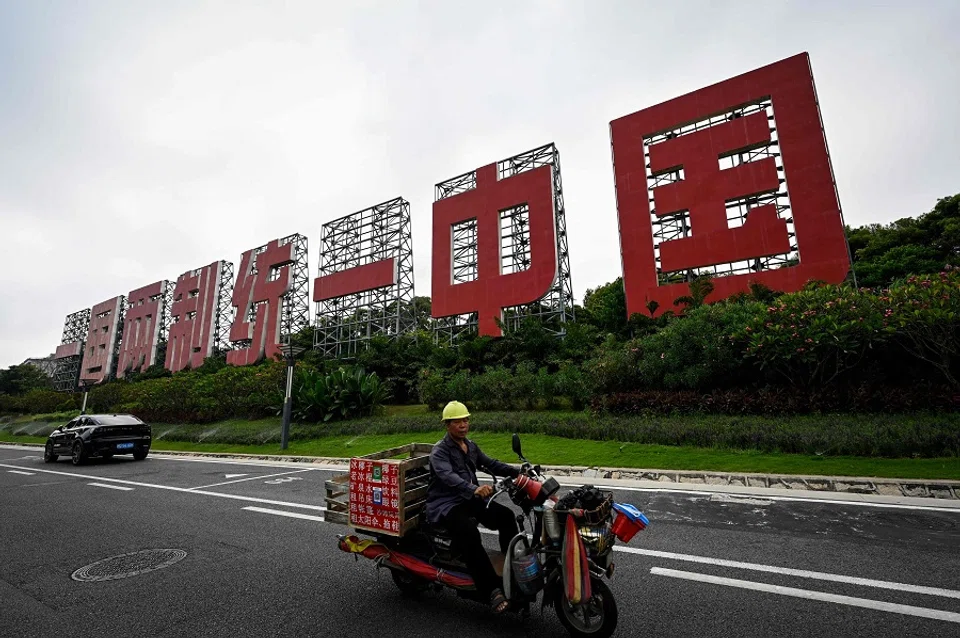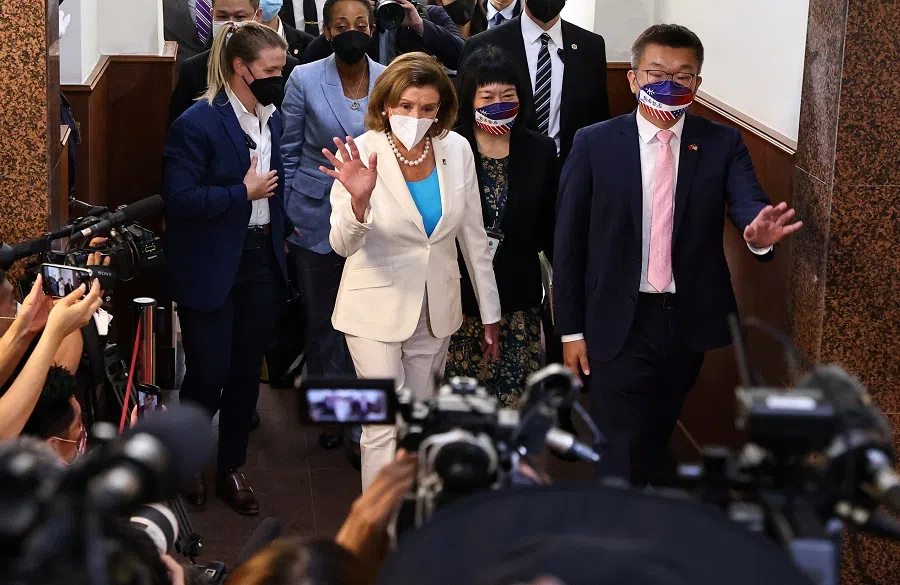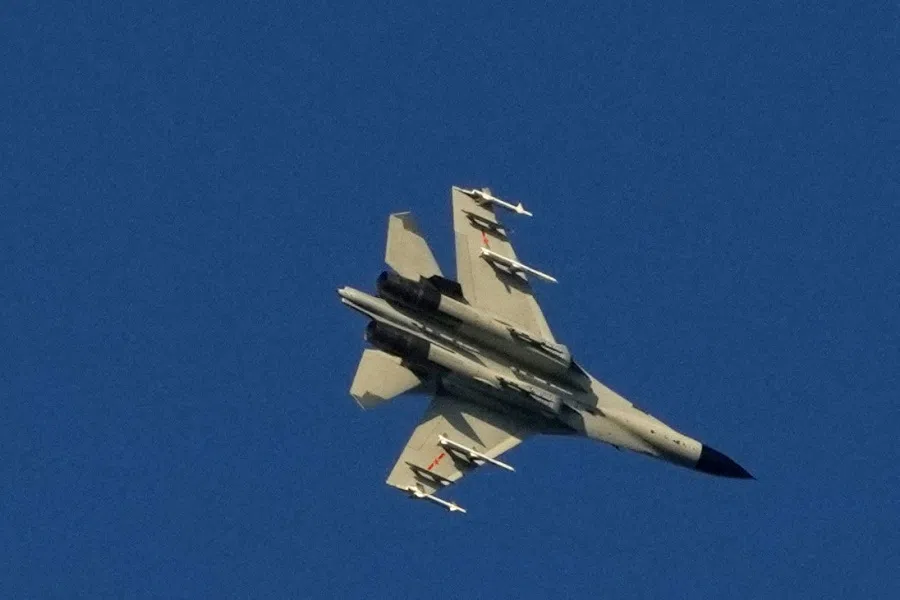China cannot afford to be impulsive on Taiwan
In the wake of US House Speaker Nancy Pelosi's visit to Taiwan and the furore that it has caused, Indian academic Amrita Jash explains why in lieu of a foolproof action plan for a total win, China's best response over Taiwan is not an invasion, but to choose to be "reactive yet act with restraint".

On 10 August, the People's Republic of China (PRC) released a new position paper titled "The Taiwan Question, China's Reunification in the New Era", which categorically states:
"We are one China, and Taiwan is part of China. This is an indisputable fact supported by history and the law. Taiwan has never been a state; its status as part of China is unalterable."
To draw a corollary, in August 1993, the PRC issued a white paper titled "The Taiwan Question and Reunification of China" which called Taiwan "an inalienable part of China" and stated the Chinese government's basic position on the settlement of the Taiwan question as "peaceful reunification; one country, two systems".
China's crucial concern is the de jure political status of Taiwan. As a result of which, since 1949, the PRC has maintained a formal policy of the "liberation of Taiwan", which until 1955 was understood to mean by use of force. But the partition of Korea, the signing of the US-Taiwan defence treaty, the Geneva agreements on the partition of Vietnam and the establishment of the Southeast Asia Treaty Organization (SEATO) forced China to abandon - temporarily - any such goal.
Between 1958 to 1979, with the shift in PRC's international status with recognition as the government of China and replacing the Republic of China (ROC) at the United Nations, China's position on Taiwan witnessed a shift from liberation to that of reunification. However, in recent times, the phrase "peaceful reunification" has replaced "reunification".
Strong reactions from China not unexpected
In this regard, the context of the 2022 white paper lies in the changed dynamics in the Taiwan Strait following US House Speaker Nancy Pelosi's visit to Taiwan in her official capacity when she landed in Taipei on the night of 2 August.
Marking the first high-level visit by a US official in a quarter of a century, Pelosi's undeterred landing in Taiwan met with the "fire and fury" of China. Ahead of the visit, Chinese President Xi Jinping had already warned the US against "playing with fire over Taiwan". Beijing's response can be read in a five-fold perspective.

First, going by the rule book, Beijing expectedly condemned the visit. The Chinese Ministry of Foreign Affairs issued a statement, saying:
"It has a severe impact on the political foundation of China-U.S. relations, and seriously infringes upon China's sovereignty and territorial integrity. It gravely undermines peace and stability across the Taiwan Strait, and sends a seriously wrong signal to the separatist forces for 'Taiwan independence'."
Second, staging a military response. The Eastern Theater Command of the People's Liberation Army conducted joint military exercises and training (2- 9 August) in the waters and airspace off the coasts of the island to the extent of crossing the median line, including "operations of joint blockade, assault on ground and sea targets, airspace control, joint anti-submarine drill, and integrated logistics and support". This also included using new armaments such as stealth fighters, multiple launch rocket systems and YY-20 refuelling aircraft.
Third, playing the diplomatic card. On 5 August, the Chinese government announced "countermeasures" by cancelling and suspending talks with the US such as the Theater Commanders Talk, talks on climate change and others. Fourth, imposing government sanctions on Pelosi against what Beijing cites as "egregious provocation".
Pelosi's visit has ramped up concerns over a possible "fourth Taiwan Strait crisis" being a litmus test between the US and China of who will blink first.
And fifth, laying the ground rules by issuing a white paper as a reminder of the "one-China" principle as well as reaffirming that China "will not renounce the use of force, and we reserve the option of taking all necessary measures" and also that the "use of force would be the last resort taken under compelling circumstances".
These responses are born out of the PRC's tendency to treat the Taiwan issue not in isolation but rather as an integral part of its overall strategy, to which the PRC repudiated the right of the ROC to claim any status as a sovereign state and made it a precondition for PRC's diplomatic relations with other states.

In this regard, Pelosi's visit has ramped up concerns over a possible "fourth Taiwan Strait crisis" being a litmus test between the US and China of who will blink first. Specifically, it demonstrated that Taiwan remains a critical flashpoint of great power dynamics between China and the US - as justified by past records of Taiwan Strait crises in 1955, 1958 and 1996. In January 2022, Chinese ambassador to the US Qin Gang had already issued a stern warning, suggesting that the US could face a "military conflict" with China over the status of Taiwan.
However, to predict that there will be a "fourth Taiwan Strait crisis" in the aftermath of Pelosi's visit is very much an exaggeration.
What is apparent is that in every crisis, the US has responded by its active intervention on behalf of Taiwan - the most significant being the positioning of the US Seventh Fleet into the Taiwan Strait against any Chinese attack. In this regard, Pelosi's visit to Taiwan in her official capacity rattled China's threat perception over its long pending quest towards "reunification with Taiwan". More importantly, it gravely surfaced the "US threat" factor. In an op-ed for The Washington Post, Pelosi said that "America stands with Taiwan, our democratic partner, as it defends itself and its freedom", and made reference to the "vows" of the US under the Taiwan Relations Act of 1979.
A fourth Taiwan Strait crisis?
However, to predict that there will be a "fourth Taiwan Strait crisis" in the aftermath of Pelosi's visit is very much an exaggeration. Any form of impulsive action against Taiwan is not in Beijing's best interests in the current times.
China cannot afford to make any such miscalculation until it has fulfilled its "target" of achieving "military modernisation, informationisation and intelligentisation". Besides, in the run-up to the 20th Party Congress, for Xi, wisdom lies in choosing "restraint" and hence, calibration is the key.
Moreover, the ongoing Russia-Ukraine war has provided Xi with a case in point for permutations and combinations over "reunification" tactics toward Taiwan. That is, if China plans to take Taiwan by force, it will have to be ready for the consequences. More importantly, if one simulates an invasion scenario, one of the pivotal roles will be played by the PLA's mastery over its logistics, for which China needs to have a foolproof plan - a key reality check drawn from the Russia-Ukraine war.
Last but not the least, any form of use of force against Taiwan will draw a strong retaliation from the US. As I have argued elsewhere, because Taiwan holds severe reputational costs for the US, it cannot afford to act reluctantly against any Chinese action, but would have to retaliate. Besides, amid the US's continuing "strategic ambiguity" over Taiwan, when asked whether "the US would come to Taiwan's defence in the event of an attack by China", Biden provided clarity by positing that: "Yes, we have a commitment to do that."
China's biggest fear lies in a "loss of face" over Taiwan which hinges on the ability to avoid the possibility of US intervention.
Above all, one needs to ask: can China afford to compromise on its aim of taking the "centre stage", as outlined by Xi at the 19th National Congress of the Chinese Communist Party in 2017?
For the PRC, the Taiwan issue is inextricably linked to its national self-respect and the survival of the party. Thus, China's biggest fear lies in a "loss of face" over Taiwan which hinges on the ability to avoid the possibility of US intervention. This dilemma raises a red flag for Beijing and hence, until it has a foolproof action plan for a total win, China's best response over Taiwan is not an invasion, but to choose to be "reactive yet act with restraint".
Related: China normalising military measures in the Taiwan Strait | When a lack of US-China dialogue on Taiwan might lead to war | Is there still hope for peaceful reunification in the Taiwan Strait? | Implications of the Russia-Ukraine war for the People's Liberation Army | Five big questions about Nancy Pelosi's Taiwan visit


![[Big read] When the Arctic opens, what happens to Singapore?](https://cassette.sphdigital.com.sg/image/thinkchina/da65edebca34645c711c55e83e9877109b3c53847ebb1305573974651df1d13a)


